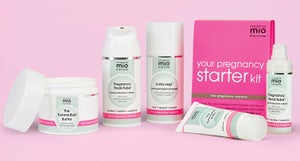Congratulations, Mama! Your journey is just beginning in your 1st Trimester and if your head is buzzing with questions all about the next few months, don't worry, we've got you. From changes in your body to essential vitamins and the dreaded morning sickness, Mum of 2 and midwife Bridie from @bumptobeyondyour_birth is here to guide you through this first stage of your pregnancy and give you the lowdown on what to expect in this exciting time.
Keep reading to find out everything you can expect in the 1st Trimester.How Does The Fetus Develop During The 1st Trimester?
The fetus develops rapidly during the 1st trimester, with the most dramatic development happening during these first three months. By the end of the first eight weeks, the once embryo is now called a fetus. By the full 12 weeks, the fetus is fully developed and is already 3-4 inches in length, which is quite impressive considering everything is already developed by just 12 months, including their fingernails!
How Long Should I Wait Until I Announce My Pregnancy?
There isn't a right or wrong answer to this, and it is down to personal choice. You can announce your pregnancy whenever you like. From experience, most parents-to-be want to wait until their first scan at roughly 12 weeks and then reveal their big news once they know the pregnancy is developing with no concerns. Other factors that may influence your decision to tell people earlier is if you need more support, like wanting to say to a colleague if you're suffering from morning sickness. Remember it's your decision, and you can tell people whenever you feel comfortable.

What Changes To My Body Can I Expect In The 1st Trimester?
Many changes occur during the 1st trimester for your fetus and yourself as a mum- to-be. Physically you can experience tender breasts, an increased need to pass urine, nausea along with vomiting, constipation, food aversions and fatigue. A lot is going on. It's also important to remember everyone is different, so what one woman may be going through, another may be experiencing relatively fewer symptoms, so avoid comparing yourself to others or trying to hide how you're feeling physically.
Emotionally you can feel a range of excitement, being overwhelmed, tearful or anxious, all are very normal, and you can switch easily between them all or with other added emotions thrown in. You're unlikely to start showing that you're pregnant at this stage, but you may feel bloated due to increased hormone levels, so clothing may start to feel tighter.
How Can I Help Morning Sickness In The 1st Trimester?
The exact causes of morning sickness are still largely unknown, but it's thought likely to be down to hormones! Morning sickness can affect some women badly, and others get away without any nausea or sickness at all, so remember it's very much down to the individual.
Some things can help with morning sickness, and my advice is to try them out and see what works best for you.
- Firstly, ginger has been used as a go-to for morning sickness by generations of women, including ginger sweets, tea, and biscuits. Avoiding hot and spicy foods can also help, along with women often going off hot drinks too, like tea and coffee. It's, therefore, a good idea to stick to drinking water, and taking regular sips to stay hydrated can also help with morning sickness.
- Another culprit is becoming overly tired, which is why nausea and sickness can worsen towards the end of the day, so avoid getting extremely tired and rest regularly.
- Plain foods and carbohydrates can also help and eat little and often. Try having a dry biscuit or crackers by your bed to have first thing in the morning or if you wake at night to ensure you always have something in your stomach. I set the alarm on my phone that went off every hour to ensure I continued to eat little and often.
- There are also alternative therapies like acupressure or acupuncture, but there's little evidence to back these up, but some women have found these helpful.
Finally, it's essential to speak to your midwife or GP if you feel morning sickness affects your daily life because they can prescribe you medication that can help. If you ever think you are becoming dehydrated, feeling unwell or unable to keep anything down, call your GP or attend your local A&E.
I suffered from morning sickness and nausea in both my pregnancies and I can sympathise now with the women I care for, take good care of yourself, talk about how you feel and be reassured for most it does pass by roughly 12-16 weeks.

Why Am I Feeling Tired?
Remember you’re growing a baby on top of everything else going on in your daily life. With so much going on, you're likely to feel quite tired during this 1st trimester. This tiredness can at times feel like no other tiredness you've ever experienced, so take care of yourself and always rest when your body tells you to. Other factors that can increase tiredness levels are hormones, lower blood pressure, disrupted sleep due to frequent urination and morning sickness.
How Can I Help Myself And My Fetus Stay Healthy In The 1st Trimester?
Taking care of yourself will also take care of your fetus, so try not to forget that you're now taking care of both of you! A well-balanced diet will keep you both healthy and build good foundations for your pregnancy, along with staying active and hydrated. Don't forget everything your body is doing to support your pregnancy and the development of your fetus in the first trimester, so eat well and rest regularly, listening to when your body needs it.
Are There Any Essential Vitamins I Should Take?
The recommendation is that women take 400 micrograms of folic acid, ideally from pre-conception until they're 12 weeks pregnant; this helps reduce the risk of developmental problems during these early weeks.
A further recommendation is taking a daily supplement of 10 micrograms of vitamin D between September and March, which helps support your baby's bones and future health. Woman may also choose to take a daily pregnancy vitamin throughout pregnancy, but this is not essential if you have a well-balanced healthy diet.
Which Exercises Are Suitable For The 1st Trimester?
Light low impact exercise is an excellent way to stay healthy and active during the 1st trimester. Due to feeling more tired than usual, remember to take it slow and don't overdo it.
How Can My Skin Change In The 1st Trimester?
Skin changes are expected as early as the 1st trimester of pregnancy and can vary from woman to woman. These changes include acne breakouts caused by extra oily skin from increased hormones, dryer, or more sensitive skin. Darkening skin colour can be one of the first signs of pregnancy caused by your body making increased amounts of melanin. There's also good news that you may experience a rosy glow or shiny appearance to the skin known as the pregnancy glow!
What Kind Of Products Should I Be Using On My Skin In The 1st Trimester?
I'd recommend using natural products that are kind to your skin. Due to some experiencing women sensitivity during this 1st trimester, apply small amounts of products first and see what works best for you. You may need to experiment with what products you now plan to use and remember what may have worked well for your skin pre-pregnancy might need to change a little to suit the changes happening.
Shop 1st Trimester
When you’re getting ready to take on trimester 2, explore our expert guide to your bodycare, here!








